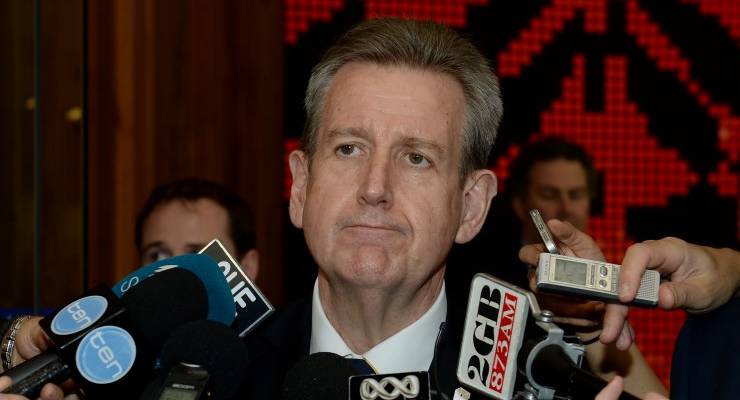
Where is responsibility in politics now?
For the rest of us, in living our lives, the consequences are clear and routinely dealt with by courts: drink-driving, jaywalking, speeding, or worse.
In how we work, beefed-up regulators and others govern our behaviour and deliver the consequences for wrongdoing.
In our police services, permanent corruption-fighting bodies plough through misdemeanours to find patterns of behaviour that need to be rooted out and addressed.
But the consequences for bad government decision-making has become harder to see, elusive almost. And the lines of where accountability begins and ends are no longer clear.
Remember when former NSW premier Barry O’Farrell received a bottle of Grange Hermitage and failed to declare it? It might seem preposterous that a politician could forget a bottle worth $3000, but apparently he did.
Even after he was reminded of it — by evidence before the NSW Independent Commission Against Corruption (ICAC) — his recollection was no better. But he copped the consequences and quit.
The ICAC later reported there had been no intention on O’Farrell’s part to mislead but it is unlikely he could have remained in the job. That lingering taste of a good red would have eventually provided a career hangover.
Just compare that with the recent decision-making of current NSW Premier Gladys Berejiklian. First her long-term boyfriend, Daryl Maguire, was hidden away. Then she insisted pork-barrelling was perfecting legal. (It might be, but where does it sit on her moral compass?)
Her ability to jump over a pile of shredded documents and to ignore her own rules while waiting for COVID test results is similarly jaw-dropping.
And yet those calling for her to cop the consequences for that sloppiness are being drowned out by her rising popularity. O’Farrell could be forgiven for wishing he’d remembered what a glass of $3000 Grange Hermitage actually tastes like.
So when should consequences kick in for poor government decision-making? Should it only be when the oversight is personal, à la O’Farrell? Or should politicians be held accountable for sloppy or poor work in their departments?
Take the robodebt fiasco. The fact that a minister such as Stuart Robert is still picking up a fat taxpayer-funded pay packet defies expectations faced by the rest of us in our everyday lives.
We’re long past applying the Westminster principle which demands ministers resign over maladministration on their watch. But is it too much to expect a tad of contrition, a trait Robert lacks?
Then there’s the shameful revelations involving some of our soldiers in Afghanistan. The question of whether medals are taken from them is a test case for how we see responsibility and accountability.
The now-scrapped plan to strip medals from soldiers who were members of units where the outrages originated was a rash one that shifted the blame from those who should be held accountable — namely, the soldiers who are the subject of any proved accusations, their superiors, and perhaps even the ministers who sat in the big offices during the sordid battlefield behaviour.
What culture was fostered by those in charge? Did their glorification of the SAS warrior myth encourage these atrocities? And should they suffer the consequences for not asking the questions that could have raised alarm?
On current standards, it’s impossible for ministers to be held accountable for such appalling behaviour. But ministerial responsibility, if it has any meaning, surely requires good governance, strong culture and constant questioning.
There’s no evidence of any of this from a succession of ministers who shared the khaki glory — which makes them just as culpable as the other non-combatants who will be called to account.








“The now-scrapped plan to strip medals from soldiers who were members of units where the outrages originated…”
That is a canard. The Brereton report recommended stripping a meritorious conduct citation from the unit. It’s not a medal and it is not awarded to individual soldiers. The award is made for the conduct of the whole unit in the whole campaign. The unit can only keep the award, given what we now know, if it is meritorious when the conduct includes war crimes.
Make the OFFICERS above the Platoon Commanders Responsible. Can we believe that the highest Australian commander leading the Afghan war in Afghanistan did not know. What kind of a commander is that? Or is the communication line and secrecy so blurred between the ranks that only the underlings know what is going on? Sad really.
Sometimes it pays quite well not to know. In fact, sometimes the pay off is even much better making deliberatively sure you don’t know..
Sad part about the lack of ‘Ministerial responsibility’ that is happening now (No LieBrals will fall on their sword for their obvious corruption) is that when Labor get back in federally, news-corpse will be all over them like a cheap suit. Can’t wait for the RC on Murderdick & his empire.
Gladys is now bulletproof it seems – sympathy abounds for her being “dudded in love”. Makes me sick. And the Feds are even worse. Ministerial accountability is now a quaint historical reference. Can’t despair though because then the game is up. At least there’s Crikey, Michael West, the Saturday Paper and, for the Millenials, FriendlyJordie 😉
I assume they’ll run this like they ran robodebt, accuse everyone and put the burden of proof on the innocent. That’s the right way to do things isn’t it?